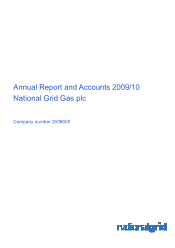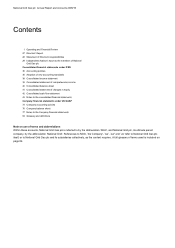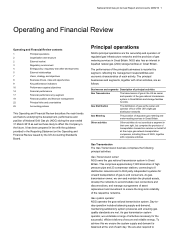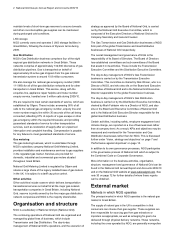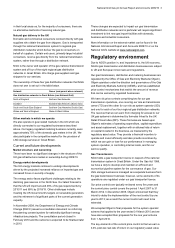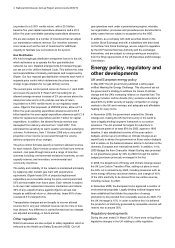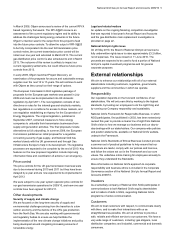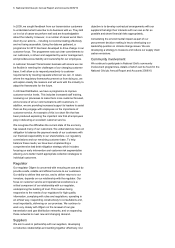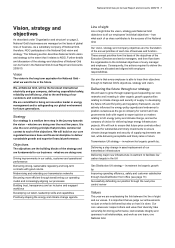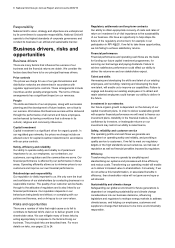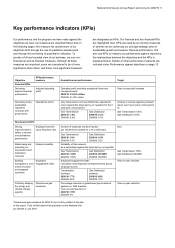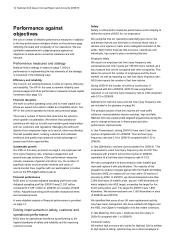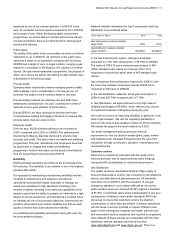National Grid 2010 Annual Report Download - page 4
Download and view the complete annual report
Please find page 4 of the 2010 National Grid annual report below. You can navigate through the pages in the report by either clicking on the pages listed below, or by using the keyword search tool below to find specific information within the annual report.
2 National Grid Gas plc Annual Report and Accounts 2009/10
maintain levels of short-term gas reserves to ensure domestic
and other non-interruptible gas supplies can be maintained
during prolonged cold conditions.
LNG storage
NGG currently owns and operates 3 LNG storage facilities in
Great Britain, following the closure of Dynevor Arms during
2009.
Gas Distribution
NGG’s Gas Distribution business comprises four of the eight
regional gas distribution networks in Great Britain. These
networks comprise of approximately 132,000 kilometres of gas
distribution pipelines. Gas is transported on behalf of
approximately 26 active gas shippers from the gas national
transmission system to around 10.8 million consumers.
We also manage the national gas emergency number (0800
111 999) for all of the gas distribution networks and for other
transporters in Great Britain. This service, along with the
enquiries line, appliance repair helpline and meter number
enquiry service, handled over 3 million calls during 2009/10.
We are required to meet certain standards of service, which are
established by Ofgem. These include: answering 90% of all
calls to the national gas emergency number, enquiry line and
meter number enquiry line within 30 seconds of the call being
connected; attending 97% of reports of a gas escape or other
gas emergency within the required timescale; and providing
guaranteed standards of service for other transportation
services, such as restoration of supply after an unplanned
interruption and complaint handling. Compensation is payable
for any failures to meet guaranteed standards of service.
Gas metering
The gas metering business, which is undertaken through
NGG’s subsidiary company National Grid Metering Limited,
provides installation and maintenance services to gas suppliers
in the regulated gas market. Services are provided for
domestic, industrial and commercial gas meters situated
throughout Great Britain.
National Grid Metering Limited is regulated by Ofgem and
retains a large share of the legacy installed base of gas meters
in the UK. It is subject to a tariff cap price control.
Other activities
Other activities include xoserve which delivers transportation
transactional services on behalf of all the major gas network
transportation companies in Great Britain, including National
Grid. xoserve is jointly owned by the five major gas distribution
network companies and NGG is the majority shareholder.
Organisation and structure
NGG is a subsidiary of National Grid plc (National Grid).
The continuing operations of National Grid are organised and
managed by global lines of business, which include
Transmission and Gas Distribution. The day-to-day
management of National Grid’s operations, and the execution of
strategy as approved by the Board of National Grid, is carried
out by the National Grid Executive Committee, which is
composed of the Executive Directors of National Grid and its
Company Secretary and General Counsel.
The Gas Transmission and Gas Distribution businesses of NGG
form part of the global Transmission and Gas Distribution
businesses of National Grid respectively.
The overall management and governance of NGG is the
responsibility of its Board of Directors. The Board of Directors
has established committees and sub-committees of the Board
that assist it in its activities. These include the Transmission
Executive Committee and the Distribution Executive Committee.
The day-to-day management of NGG’s Gas Transmission
business is carried on by the Transmission Executive
Committee. This committee is chaired by Nick Winser, who is a
Director of NGG, and who also sits on the Board and Executive
Committee of National Grid and is the National Grid Executive
Director responsible for the global Transmission business.
The day-to-day management of NGG’s Gas Distribution
business is carried on by the Distribution Executive Committee,
chaired by Mark Fairbairn who is a Director of NGG, and also
sits on the Board and Executive Committee of National Grid
and is the National Grid Executive Director responsible for the
global Gas Distribution business.
Certain activities, including safety, employee engagement and
climate change, are reported on a line of business level rather
than at company level. As a result, KPIs and objectives may be
measured and monitored for the Transmission and Gas
Distribution businesses rather than for NGG. This is discussed
further under ‘Vision, strategy and objectives’ on page 7 and
‘Performance against objectives’ on page 10.
In addition to its own governance processes, NGG participates
in the governance process of National Grid which is subject to
the Combined Code on Corporate Governance.
More information on the business activities, organisation,
structure, management and governance of National Grid can be
found in the National Grid Annual Report and Accounts 2009/10
and on the National Grid website at www.nationalgrid.com. See
note 30 on page 72 for further details of where these reports
can be obtained.
External market
Markets in which NGG operates
The principal market in which NGG operates is the natural gas
market in Great Britain.
The supply of natural gas in the UK is competitive in that
consumers can choose their gas supplier. Those suppliers are
then responsible for sourcing gas from gas extractors or
importers as appropriate, as well as arranging for gas to be
delivered through physical delivery networks. These networks,
including the ones operated by NGG, are generally monopolies

